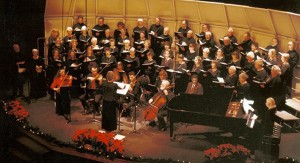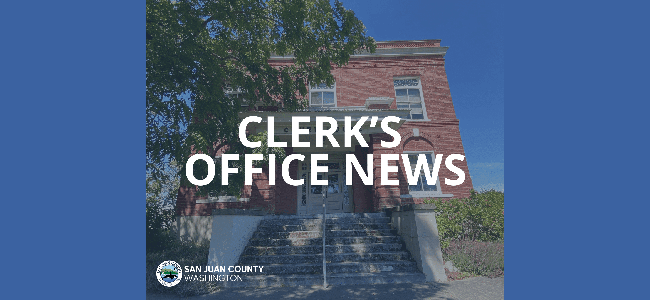Choir to Sing Historic and Contemporary Christmas Music
Roger Sherman, new Director of the Orcas Choral Society, has chosen music from the 16th century to contemporary classical repertoire for the Christmas concerts this weekend.
“There will be many beautiful moments in this concert,” Sherman says, including “many contemporary songs whose harmonies are rooted in Romantic lyricism.”
Sherman has introduced songs to the 60-member choir that make use of the “dialogue between choirs” that was the innovation of 16th century composer Giovanni Gabrieli.
The concerts, which will take place Saturday and Sunday, Dec. 11 and 12, also feature an impressive brass presence, with 10 instrumentalists in a double “choir” brass ensemble, assembled by Island trumpet player Steve Alboucq.
Sherman got the idea of including a brass ensemble in the Choral Society program after enjoying Friday “Pub Night” performances by Alboucq at the Orcas Hotel. “We are so fortunate to have Steve and all the great brass players on the islands,” Sherman said. (All but the two trombonists are from the San Juan Islands.)
Alboucq will accompany the choir in the opening number, “A Child is Born in Bethlehem,” composed around 1600 by Samuel Scheidt, a work influenced by Gabrieli, who was choirmaster at the Cathedral of San Marco in Venice, Italy. This Eastern-style cathedral had “spectacular acoustics” and an unusual architectural feature: balconies on either side of the chancel, the area surrounding the church altar. Gabrieli’s innovation was to write music for two choirs, in dialog from the balconies, and later, antiphonal music for two brass choirs.
This musical effects were so stunning that musicians from all over Europe came to San Marco and returned to write similar music for their home town churches and cathedrals — getting churches to modify their architecture so that antiphonal music was possible in the chancel area of their church.
In the north of Europe, buildings were built that could accommodate up to eight separate choirs singing in dialog with each other. Gabrieli’s influence can even be heard in Bach’s great oratorios such as “The Passion of Saint Matthew.”
The Orcas Choral Society concert will include two antiphonal brass pieces by Gabrieli, and several pieces inspired by Gabrieli – the introductory Scheidt piece and the concluding “Christmas Cantata” by American composer Daniel Pinkham.
The first section of the program features the music of Felix Mendelssohn, who, like Mozart, was a child musical prodigy, and, like Mozart, he died before he was 40. Mendelssohn was born of Jewish heritage to an “extraordinarily musical family,” and in addition to his own musical genius, he resurrected the works of J.S. Bach, initially through a concert performance of Bach’s “The Passion of Saint Matthew,” in 1829. Bach became an overnight sensation, thanks to Mendelssohn and his friend Robert Schumann, who helped orchestrate the concert.
Mendelssohn was inspired by Bach’s “Passions” and Handel’s “Oratorios” to compose several full-scale oratorios (“Elijah”, “St Paul”), and an incomplete work named “Christus.” Although he died before completing “Christus” he did finish a beautiful chorus with text from the Old Testament, “There Shall a Star from Jacob Come Forth,” which will be sung by the Choral Society. Mendelssohn incorporated the beautiful Epiphany chorale, “How Brightly Beams the Morning Star” as the finale to the piece.
The choir will then sing from the “Sechs Spruche” (Six Anthems) composed by Mendelssohn, all based on liturgical holidays of the Lutheran church calendar (Mendelssohn became a Lutheran late in his life). The songs are loosely modeled after the music of Palestrina, though they are more emotional and expressive. The Choral Society will sing three of the rarely heard eight-part motets: “Christmas,” “New Year’s Day” and “In Advent.”
The second part of the program will begin with an Aria by Belgian composer Flor Peeters, written for trumpet and piano, which will be played by Steve Alboucq and Becky Johnson.
Next, the choir will sing “Precious Gift His Wondrous Birth,” the first performance of a new version of a 2009 carol by jazz great, Dave Brubeck, who has composed much sacred music. Sherman heard the work last year when he was recording in Baltimore, and when he inquired about permission to have the Orcas choir sing it, Brubeck replied affirmatively, with the most recent, updated version of the work. The words of “Precious Gift” are written by Brubeck’s wife, Iola.
“Torches” was written by South African composer John Joubert in 1952; the words are translated from the Galician. It expresses a lilting excitement in an invitation to sing a lullaby to Christ.
English poet William Blake’s gentle poem, “The Lamb” was set to music by John Tavener in 1982. In it, the choir asks simple questions in dissonant melodies that resolve in a profound, “God bless thee.”
“Lux Arumque” is a simple, soothing piece written by Eric Whitacre, a young American composer whose work is popular, widely-performed and original. The text of “Lux Arumque”was translated from an English poem by Edward Esch into Latin. “Lux Arumque” blends the warmth of light with the heaviness of gold as he describes the angel choirs at Christ’s birth.
The concert finale is “Christmas Cantata,” a three-movement, double-choir 20th century work, inspired by Gabrieli, with liturgical texts and a “significant” American jazz feel to it. It was written in the 1950s by Daniel Pinkham, when he was organist and choir director at King’s Chapel in Boston.
In keeping with Orcas Choral Society tradition, the audience will be invited to sing along on three traditional carols, including “Silent Night.”
Sherman assumed leadership of the Choral Society this fall following Founding Director Catherine Pederson’s 33-year legacy conducting the group in rehearsals and semi-annual concerts. He says, “It’s a thrill to direct the Choral Society; I totally enjoy working with the choir. I’m amazed at their spirit and enthusiasm — and what a wonderful thing to spend a couple of hours together every week, singing and making music.”
Sherman has made few changes to the choir, beyond changing the seating arrangements at weekly rehearsals in the Madrona Room of Orcas Center. He also has programmed a number of a cappella (unaccompanied) pieces in the Choral Society’s repertoire.
In November, he invited the Choral Society to rehearse at St. Mark’s Cathedral in Seattle, where he is the associate organist. At the huge stone cathedral above the interstate freeway on Seattle’s Capitol Hill, the choristers got to hear themselves sing “where there’s room to give back sound,” Sherman says. “It helps them tune themselves and helps the ensemble sound.”
Tickets are $10, $3 for students. There are two performances: Saturday December 11 at 7:30 p.m. and Sunday December 12 at 2 p.m., both in Orcas Center. Seating is reserved and tickets frequently sell out. To ensure that you hear this concert be sure to reserve your seat as soon as possible by calling the Orcas Center box office at 360-376-2281 or go to www.orcascenter.org to order tickets online.
**If you are reading theOrcasonian for free, thank your fellow islanders. If you would like to support theOrcasonian CLICK HERE to set your modestly-priced, voluntary subscription. Otherwise, no worries; we’re happy to share with you.**







